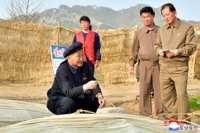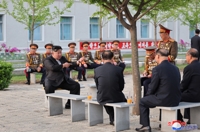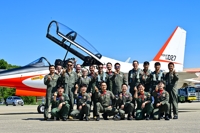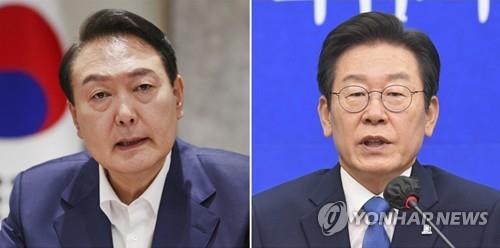S. Korea, China experts spar over U.S. missile-defense system
SHANGHAI, Nov. 28 (Yonhap) -- Security experts of South Korea and China clashed Friday over a possible deployment of an advanced U.S. missile-defense system on South Korean soil, highlighting a long-standing rift between Seoul and Beijing despite their growing warmth on bilateral ties.
South Korea has officially disavowed its intention to join or host the U.S. missile-defense system known as the Terminal High-Altitude Area Defense (THAAD) battery, but the Pentagon has said it is considering deploying it in South Korea to better defend against missile threats from North Korea. About 28,500 U.S. troops are stationed in South Korea.
China's opposition to a deployment of the THAAD battery in South Korea has been well known, but the disagreement at a forum, jointly hosted by the South Korean Consulate General in Shanghai and the Shanghai Academy of Social Sciences, again proved how it is difficult for South Korea and China to develop common security interests in Northeast Asia.
Liu Ming, deputy head of the Institute of International Relations at the Shanghai institute, told the forum that a deployment of the advanced U.S. missile-defense system in South Korea would "pose a threat" to China's security interests because its radar system can monitor military facilities in China.
Nam Sung-wook, a professor of North Korean studies at Seoul-based Korea University, hit back at the Chinese opposition, saying that South Korea can't intercept a North Korean missile flying at an altitude higher than 100 kilometers.
"South Korea's current missile-defense system has limits. If North Korea launches a missile toward South Korea at an altitude of higher than 100 kilometers, we are unable to intercept it," Nam said. "The South Korean government will not leave the situation as it is."
Nam, who also serves as a policy adviser at South Korea's defense ministry, said South Korea "can't help but deploying" the THAAD battery because the country's security is under threat from North Korea's missiles.
Nam called on China to "play a more active role" in persuading North Korea to give up its nuclear weapons program.
Earlier this week, the Chinese ambassador to South Korea, Qiu Guohong, warned that, if South Korea allows the U.S. to deploy the THAAD battery on its soil, it would hurt Seoul-Beijing relations, a South Korean lawmaker said after meeting him.
The remarks by Qiu were quoted by Rep. Won Hye-young of the main opposition New Politics Alliance for Democracy (NPAD), who met the Chinese envoy in his capacity as the head of a parliamentary committee for the development of inter-Korean exchanges.
In spite of international sanctions, North Korea continues to pose security threats to Northeast Asia and beyond, by developing its nuclear and ballistic missile programs.
North Korea, which has conducted three nuclear tests since 2006, has threatened to conduct a new nuclear test in response to a U.N. resolution condemning its human rights violations.
South Korea and the U.S. have called on China to play a greater role in leading North Korea to give up its nuclear weapons, but Beijing's diplomacy still appears to put its priority on stability, rather than the denuclearization of North Korea.
kdh@yna.co.kr
(END)
-
 'Queen of Tears' weaves rich tapestry of Korean contemporary art
'Queen of Tears' weaves rich tapestry of Korean contemporary art -
 Ateez member Yunho throws first pitch at MLB match between Dodgers, Mets
Ateez member Yunho throws first pitch at MLB match between Dodgers, Mets -
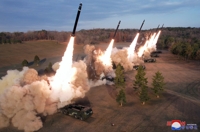 N. Korea says Kim guided simulated nuclear counterattack drills for 1st time
N. Korea says Kim guided simulated nuclear counterattack drills for 1st time -
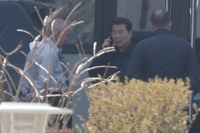 N. Korea calls envisioned U.S. aid to Ukraine 'hallucinogen'
N. Korea calls envisioned U.S. aid to Ukraine 'hallucinogen' -
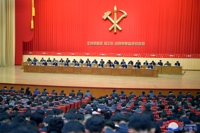 N. Korea calls on party propaganda officials to work harder
N. Korea calls on party propaganda officials to work harder
-
 'Queen of Tears' weaves rich tapestry of Korean contemporary art
'Queen of Tears' weaves rich tapestry of Korean contemporary art -
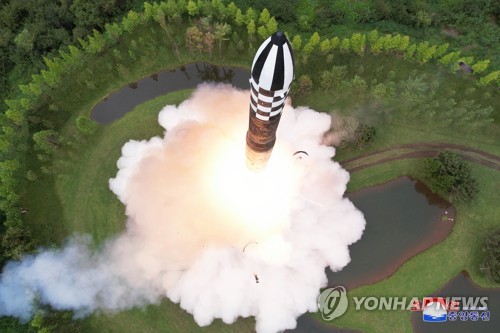 Experts see possibility of N.K. conducting nuclear test before U.S. presidential vote
Experts see possibility of N.K. conducting nuclear test before U.S. presidential vote -
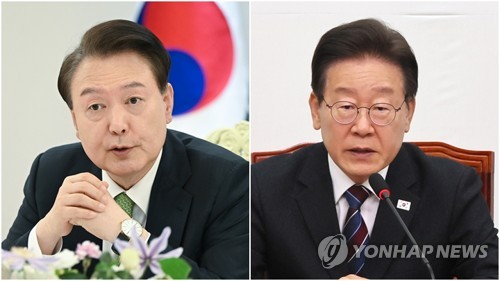 Details of meeting between Yoon, opposition leader undecided: presidential office
Details of meeting between Yoon, opposition leader undecided: presidential office -
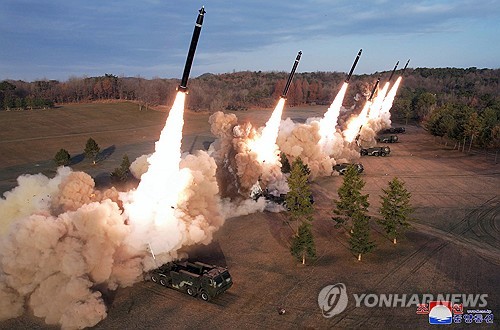 N. Korea says Kim guided simulated nuclear counterattack drills for 1st time
N. Korea says Kim guided simulated nuclear counterattack drills for 1st time -
 Looming weekly closure of major hospitals feared to worsen medical service crisis
Looming weekly closure of major hospitals feared to worsen medical service crisis
-
 S. Korea eliminated in Olympic football qualifiers as poor defense, undisciplined play prove costly
S. Korea eliminated in Olympic football qualifiers as poor defense, undisciplined play prove costly -
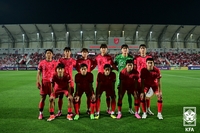 10-man S. Korea lose to Indonesia to miss out on Paris Olympic football qualification
10-man S. Korea lose to Indonesia to miss out on Paris Olympic football qualification -
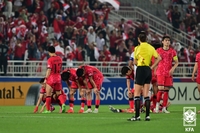 (LEAD) 10-man S. Korea lose to Indonesia to miss out on Paris Olympic football qualification
(LEAD) 10-man S. Korea lose to Indonesia to miss out on Paris Olympic football qualification -
 Indonesia coach left with mixed feelings after eliminating native S. Korea in Olympic football qualifiers
Indonesia coach left with mixed feelings after eliminating native S. Korea in Olympic football qualifiers -
 (3rd LD) Hybe to file complaint against sublabel executives over internal conflict
(3rd LD) Hybe to file complaint against sublabel executives over internal conflict















